Hello again, readers of The Fandomentals. Last time I was here, I dealt with the topic of power dynamics in the Avatar franchise, particularly the first season of Legend of Korra. The conclusion was not optimistic. Today, as promised, I’ll be taking a look at the “Dragon Age” series of video games, not the novels, comics and other supplementary material. And the look is… not particularly optimistic either. It’s difficult to draw a direct comparison, though, given the simple difference in volume. Dragon Age is three big-budget games and counting. It’s a lot of material.
The series takes place in a nominally dark fantasy setting of Thedas (it’s really high fantasy with a coat of brown paint, but never mind that). The societies presented have many tensions, power imbalances and explosive issues, but in this article, I will focus on the relationship between mages, Templars and the general population. Issues like the discrimination of elves or the casteless dwarves, while interesting in their own right, are a much more direct parallel to real-world ethnic and class divisions. As such, they’re a topic for another discussion.
Mages in the Dragon Age series are, on the surface, fairly standard fantasy fare: they wear robes, carry staves and throw fireballs at people, especially in the first game, which is very generic overall. Fortunately, the series rises above being a grayish blend of Dungeons & Dragons and A Song of Ice and Fire later on.
However, their place in the society is, while not original, not entirely typical. In most societies of the known world, and certainly those the player characters move around in, mages are cloistered off in Circles of Magi. Isolated from the rest of society, they study magic and learn to protect themselves under the watchful eye of Templars, an order of knights trained in denying magic. The primary reason for it is that the mages’ connection to Fade, a realm of dreams and spirits, makes them vulnerable to demon possession. Which results in becoming destructive monsters for whom the only cure is a sword through the head. Mages are isolated to protect the population from them, and vice versa.
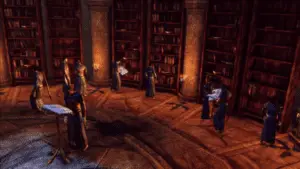
Religious motivations also come into play. The Circles of Magi are under the authority of the Chantry, a world-wide church and a rather usual Christianity stand-in. With the exception of being less patriarchal, since the priesthood is predominantly female, including the Pope equivalent (male priests are mostly bureaucrats). The Chantry was formed by Andraste, a prophetess who may or may not have received a revelation from the Maker, the creator deity. What she certainly did do was overthrow a magocratic empire whose slave-keeping mage rulers trampled over the known world. This led to the motto of the Circles: “Magic exists to serve man, and never to rule over him.” The mage rulers (called magisters) also abused blood magic, which uses blood to additionally fuel a mage’s power. It can also control minds, which normal magic can’t.
Finally, according to the Chant, some of the magisters tried to usurp the throne of the Maker with their blood magic. For this, he punished the world with monsters called Darkspawn; the first game centres around fighting them. So there’s an “original sin” element to it as well.
So, that’s the situation we have to deal with. How do the games handle it? The answer is… varied, but on the whole, not very well.
The first game introduces the conflict rather matter-of-factly. If the player character is a mage, they begin the game in the Circle tower, and go through the Harrowing, a trial which tests their resistance to possession. If they succumb to possession, the Templars execute them. Of course, the player passes the test, but then their friend asks them for help. He wants to escape, since he’s afraid the Templars will make him Tranquil. Which means cutting a mage off from the Fade, rendering them unable to cast, immune to possession… and unable to produce any emotions.
The player has a choice: help him, or turn him in. The latter option is treated mostly as an afterthought, and ends the same way as when the player chooses to help their friend. Which, unfortunately, feels fairly railroaded. It’s hard to shake off the feeling that the writers simply expected the players to rebel against the Circle rules. Interestingly enough, the player character’s friend is actually guilty of what he’s accused of – blood magic.
Whether or not the player character is a mage, eventually they need to go to the Circle tower and recruit the mages against the Darkspawn. Which runs into a problem: one of the senior enchanters unleashed demons and abominations, who overran the tower.
The final choice after liberating the Circle tower is to recruit the mages into your army, or go through with the Right of Annulment. In which case the Templars cordon the mages off and join your army instead. There’s not much of a reason to pick the latter option unless you just want to be evil, really. The only NPC actually suggesting it clearly suffers from trauma, and his only argument is “they could be abominations and hiding it”. Not to mention, why can’t the Templars join the army if the mages do? Their job is to protect and control them. It’d make perfect sense for them to follow their charges to the frontline, both to keep an eye on them and keep the Darkspawn off their squishy mage selves.
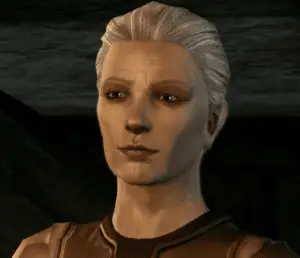 One of the player’s possible companions, Wynne, provides a counterpoint. She’s an old mage who supports the Circle structure, and considers it her home. Overall, though, the conflict isn’t explored in depth. When it is explored, it generally skews in favour of the mages.
One of the player’s possible companions, Wynne, provides a counterpoint. She’s an old mage who supports the Circle structure, and considers it her home. Overall, though, the conflict isn’t explored in depth. When it is explored, it generally skews in favour of the mages.
Dragon Age 2, the second instalment in the series, makes the conflict between mages and templars one of the central plotlines – arguably, the most central. So it examines it in more detail and depth than the first game does. Unfortunately, it falls into many traps while it does so.
Generally speaking, the conflict falls into an altogether too common pitfall of trying to present a morally grey conflict, and making one of the sides clearly in the right. In this case, the mages. The characters and codex entries make fair points about why the safety of society depends on mages being controlled. But it doesn’t really stand up in the face of repeated abuse of their basic human (or elven) rights. The game gives you the option to side with the templars’ side of the conflict… but it’s hard to do so without feeling like you’re participating in something ugly. The first time I played it, I was ready to side with them… and still ended up with a mage sympathizer who changed his mind at the last minute.
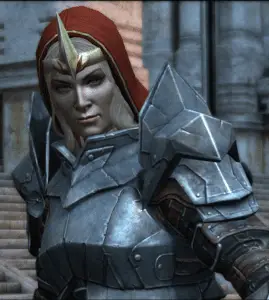 The problem is embodied by Knight-Commander Meredith, the leader of the templars in Kirkwall. Or, as I like to call her, a walking Godwin’s Law magnet. The representative of the templar point of view in Dragon Age 2 is ruthless, paranoid and prone to using the Rite of Tranquility. She does have moments where she makes good points and is remarkably reasonable, but those require you to side with her in the first place. Which you might not be willing to do after hearing about her decisions and meeting her in person.
The problem is embodied by Knight-Commander Meredith, the leader of the templars in Kirkwall. Or, as I like to call her, a walking Godwin’s Law magnet. The representative of the templar point of view in Dragon Age 2 is ruthless, paranoid and prone to using the Rite of Tranquility. She does have moments where she makes good points and is remarkably reasonable, but those require you to side with her in the first place. Which you might not be willing to do after hearing about her decisions and meeting her in person.
The game does try to balance it out, mostly in the form of mages causing mayhem for a variety of reasons. Sometimes they have a goal, and sometimes they’re possessed. The goal seems to be to emphasize the danger mages can pose to the common people.
And, to be fair, it does work. In Origins, the Templars and the Chantry seemed to be oppressive jerks to mages for little to no reason. In Dragon Age 2, we at least get to see what happens when mages run unchecked. Unfortunately, as I said, it doesn’t really balance out the abuse the templars heap on them. Especially since more than a few of the mages who wreak havoc do so out of desperation. Which shows that apart from being mortally questionable, the Chantry’s methods are simply ineffective. They breed resentment and anger that encourage mages to lash out. And so a vicious cycle is born.
All of this comes down to a rather common but aggravating form of introducing moral ambiguity: make everyone a colossal bastard, unhinged, or both. The result is, sadly, that many a player will simply want to leave the city to burn. And many other players will believe all templars are corrupt bullies who they have to oppose. While there are decent Templars, they mostly end up dead. Regardless of the player’s choices, the game ends with a mage bombing the Kirkwall Chantry, and an all-out battle between the mages and Templars. Which sparks a revolution in all the Circles.
The third instalment of the series, Dragon Age: Inquisition, spends some time on the aftermath of the mage-Templar war, and the dissolution of the Circle system. The game’s events are set in motion during a conclave that had been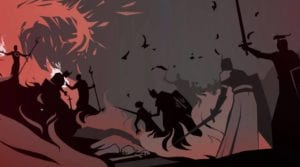 called for as a last-ditch attempt to broker peace between the warring sides. The conflict is subsequently a sort of background to the rest of the plot. It’s not the central issue, but it’s clear that many events of the game are a result of those tensions. The player also needs to enlist the help of either the rebel mages or the Templars. Many characters voice their own opinions on the subject, knowing that they will have to resolve the situation.
called for as a last-ditch attempt to broker peace between the warring sides. The conflict is subsequently a sort of background to the rest of the plot. It’s not the central issue, but it’s clear that many events of the game are a result of those tensions. The player also needs to enlist the help of either the rebel mages or the Templars. Many characters voice their own opinions on the subject, knowing that they will have to resolve the situation.
While Inquisition doesn’t devote as much time to it, I feel like it does the best job at handling the conflict. No one except fanatics consider the situation prior to the rebellion to be acceptable, but opinions differ about whether the rebellion was justified, and what should be done in the future. There are no easy answers, which is how it should be. Instead of asking the player to stand behind an oppressive system, the game provides different views on how to rebuild a world gone mad. This helps keep things on a certain level.
The game also portrays Templars in a more varied fashion. One of the characters, Cole, voices a good characteristic of what makes a good Templar: the best of them not only want to protect people, but they remember mages are people.
So that’s how the games tackle the issue. Most players come from it all favouring mages and disliking Templars. Which makes sense, given the presentation. I was in the same camp. But with time, my point of view changed and I examined it with dissatisfaction. There’s potential for a good discussion, which the game only does justice in Inquisition, if that.
Unlike Legend of Korra, the mages are quite definitely an oppressed minority. But it wasn’t always this way, and in fact it’s not really the natural order of things. The Tevinter Imperium used to rule the known world. Mages still rule its remnants, with non-mages being second-class citizens or slaves. The oppressive Chantry system originates from people who had every reason to consider mages their enemies. Which doesn’t excuse it, but it provides context. Fear of magic isn’t based on mindless prejudice. It has a source in very real capabilities of magic.
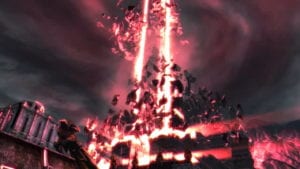
As such, I think the conflict between mages, Templars and “ordinary” people is one of freedom and security. How far are we willing to restrict the freedom of the few to secure the security of the many? Mages have the same inalienable rights as non-mages. But non-mages have the right not to fear being devoured by an abomination, mind-controlled or simply struck down by a fireball. It’s a bit difficult to see it from the player’s point of view, admittedly. The protagonists of the three games cut down mages and demons by the truckload, in the best traditions of RPGs. But as a regular person, just trying to go about their life? Mages are scary. And a dedicated force of non-mages who can oppose them start sounding like a good idea.
The exact balance of power between mages and non-mages is ambiguous, to be fair. The story and world-building play them up as powerful, but game balance demands that warriors and rogues are also useful. I suppose the most useful way to sum it up is that highly competent fighters, spies and agents can go toe-to-toe with mages, but most non-mages don’t have that luxury. Templar abilities allow to even out the playing field on a larger scale. Mind you, Templar NPCs are only marginally less inept than others at dealing with magic and demons. My issues with the mechanics of the series are a topic for another article or two, though.
Still, to address the elephant in the room – being a mage is pretty kickin’ rad. If you avoid possession (and most mages manage that, even if they use blood magic), you get abilities others can only dream of. Quite literally, given the origin of the mages’ power.
Templars are an interesting case in their own right. They’re a cadre of warriors with the ability to deny and nullify magic. Their actual competence varies over the series. In Origins, they’re rather inept. In Dragon Age 2, they’ve actually got some teeth. Inquisition is the first game to actually show them use their anti-magic abilities – before, only player characters who took the specialization showed any. Those abilities come from lyrium, the setting’s go-to magic substance. By ingesting it in a refined form, they can learn to deny magic.
The problem is, lyrium is highly addictive. Templars become dependent on it, and suffer badly if cut off from it. If they do keep taking it, though, it eventually takes a toll on their minds. The first game suggests that they don’t actually need lyrium, and that the Chantry uses it to control them. By Inquisition, it was done away with; templars do need lyrium, and it causes addiction. Which is for the best. Removing it would cut away a nuanced conflict.
Mind you, the way the chantry dooms so many people to addiction is still very morally murky. But on the other hand, Thedas needs a force of non-mages keeping mages in check. That’s the ticket here. Both the lyrium addiction and the need to keep such a force from becoming as abusive as the Templars had are obstacles that must be overcome somehow. And to be fair, Inquisition touches on those conflicts. Especially in the case of Cullen, one of the protagonist’s advisors, who’s an ex-Templar. He’s trying to break away from his addiction, and the player has the option of encouraging him one way or the other.
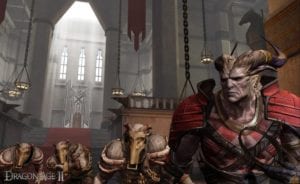 I should note that as oppressive as the Circles of Magi can get, they’ve got nothing on the Qunari. The horned giants refer to mages as “saarebas,” literally “dangerous thing.” They collar and chain them, and put them to death if they spend any time separate from their “handler”. Which can take the form of suicide – their conditioning is that strong. The reasoning for is that they may be corrupted and not know it; this risk is considered enough to condemn them. Ideology aside, we eventually learn that Qunari mages are extremely powerful compared to humans or elves. Not that it has any effect if the player chooses to create a qunari mage in Inquisition. But I’ve already mentioned that the series isn’t good at reconciling story and gameplay.
I should note that as oppressive as the Circles of Magi can get, they’ve got nothing on the Qunari. The horned giants refer to mages as “saarebas,” literally “dangerous thing.” They collar and chain them, and put them to death if they spend any time separate from their “handler”. Which can take the form of suicide – their conditioning is that strong. The reasoning for is that they may be corrupted and not know it; this risk is considered enough to condemn them. Ideology aside, we eventually learn that Qunari mages are extremely powerful compared to humans or elves. Not that it has any effect if the player chooses to create a qunari mage in Inquisition. But I’ve already mentioned that the series isn’t good at reconciling story and gameplay.
Another interesting case is that of Fenris. He’s one of the companions who can join you in Dragon Age 2. An elven warrior with lyrium tattoos and amnesia. He’s also both running from and hunting a Tevinter magister who owned him as a slave. As you can expect, he’s got a bone to pick with mages. He says that if left unchecked, mages will make themselves magisters. And, to be fair, he did see mages at their worst. He suffered abuse at their hands. He knows what they can do to people if there’s nothing to restrict them.
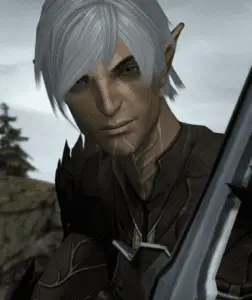
Fenris sometimes brings up a point that I think is crucial to the discussion. Power corrupts. That’s a statement which borders on being trite. But it’s true. Regular, mundane power found in our real world can corrupt enough – money, influence, or simply being physically strong. What about the power to turn reality inside-out? Summon demons, control minds or raise the dead? Most mages won’t be able to do it, of course. Most mages will also find the thought of doing it horrifying. But what if they’re pushed? What if they’re desperate?
By the end of Dragon Age 2, as the situation continues its breakneck pace towards rock bottom, an otherwise deplorable character makes a pointed observation. “Push them into a corner, and they’ve got options we don’t”, he says, referring to mages creating undead.
I find it an interesting, and morally ambiguous, topic. It’s unfair to pre-emptively blame people with power for what they could do. When Fenris says that every mage will eventually succumb, it’s his bitterness speaking through him. But people have breaking points, so what happens is a mage reaches theirs? Will there be a situation that will make tapping into forbidden powers, or just letting loose, acceptable? The possibility of turning to blood magic or demons is always there. If a mage faces a situation they can’t overcome, they will know that maybe they could succeed if only they had a bit more power. Can they resist the temptation?
At which point does “could” become “should”? At which point does caution become prejudice? How much scrutiny can we apply to someone because of the power they didn’t choose? Those aren’t easy questions to answer. But I hope more fiction tries to talk about them.
As we can see, Dragon Age introduces a potentially interesting conflict, but isn’t usually up to the task of talking about it. Its attempts fall into common traps and suffer from the usual flaws of its company’s writing. But even those failures open up some very interesting talking points.
Images courtesy of BioWare

